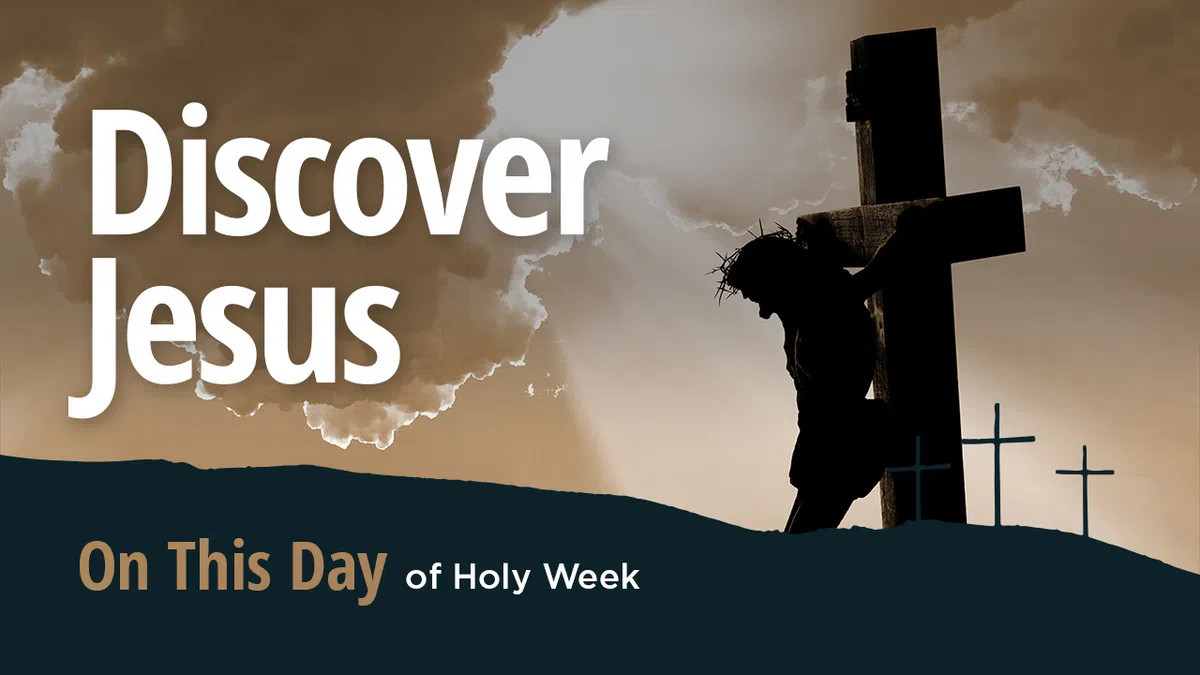Immerse Yourself:
It is Good Friday. The crowds want to crucify Jesus and he is sent to the cross to die…for you and for me.
Listen to “Good Friday | Easter Drama Day 6” on Spreaker.
Read today’s supporting scripture: Re-read Luke 22. Read Luke 23, Matthew 27, John 19, Isaiah 53, Mark 15
Luke 23
Jesus’ Trial before Pilate
23 Then the entire council took Jesus to Pilate, the Roman governor. 2 They began to state their case: “This man has been leading our people astray by telling them not to pay their taxes to the Roman government and by claiming he is the Messiah, a king.”
3 So Pilate asked him, “Are you the king of the Jews?”
Jesus replied, “You have said it.”
4 Pilate turned to the leading priests and to the crowd and said, “I find nothing wrong with this man!”
5 Then they became insistent. “But he is causing riots by his teaching wherever he goes—all over Judea, from Galilee to Jerusalem!”
6 “Oh, is he a Galilean?” Pilate asked. 7 When they said that he was, Pilate sent him to Herod Antipas, because Galilee was under Herod’s jurisdiction, and Herod happened to be in Jerusalem at the time.
8 Herod was delighted at the opportunity to see Jesus, because he had heard about him and had been hoping for a long time to see him perform a miracle. 9 He asked Jesus question after question, but Jesus refused to answer. 10 Meanwhile, the leading priests and the teachers of religious law stood there shouting their accusations. 11 Then Herod and his soldiers began mocking and ridiculing Jesus. Finally, they put a royal robe on him and sent him back to Pilate. 12 (Herod and Pilate, who had been enemies before, became friends that day.)
13 Then Pilate called together the leading priests and other religious leaders, along with the people, 14 and he announced his verdict. “You brought this man to me, accusing him of leading a revolt. I have examined him thoroughly on this point in your presence and find him innocent. 15 Herod came to the same conclusion and sent him back to us. Nothing this man has done calls for the death penalty. 16 So I will have him flogged, and then I will release him.”[a]
18 Then a mighty roar rose from the crowd, and with one voice they shouted, “Kill him, and release Barabbas to us!” 19 (Barabbas was in prison for taking part in an insurrection in Jerusalem against the government, and for murder.) 20 Pilate argued with them, because he wanted to release Jesus. 21 But they kept shouting, “Crucify him! Crucify him!”
22 For the third time he demanded, “Why? What crime has he committed? I have found no reason to sentence him to death. So I will have him flogged, and then I will release him.”
23 But the mob shouted louder and louder, demanding that Jesus be crucified, and their voices prevailed. 24 So Pilate sentenced Jesus to die as they demanded. 25 As they had requested, he released Barabbas, the man in prison for insurrection and murder. But he turned Jesus over to them to do as they wished.
The Crucifixion
26 As they led Jesus away, a man named Simon, who was from Cyrene,[b] happened to be coming in from the countryside. The soldiers seized him and put the cross on him and made him carry it behind Jesus. 27 A large crowd trailed behind, including many grief-stricken women. 28 But Jesus turned and said to them, “Daughters of Jerusalem, don’t weep for me, but weep for yourselves and for your children. 29 For the days are coming when they will say, ‘Fortunate indeed are the women who are childless, the wombs that have not borne a child and the breasts that have never nursed.’ 30 People will beg the mountains, ‘Fall on us,’ and plead with the hills, ‘Bury us.’[c] 31 For if these things are done when the tree is green, what will happen when it is dry?[d]”
32 Two others, both criminals, were led out to be executed with him. 33 When they came to a place called The Skull,[e] they nailed him to the cross. And the criminals were also crucified—one on his right and one on his left.
34 Jesus said, “Father, forgive them, for they don’t know what they are doing.”[f] And the soldiers gambled for his clothes by throwing dice.[g]
35 The crowd watched and the leaders scoffed. “He saved others,” they said, “let him save himself if he is really God’s Messiah, the Chosen One.” 36 The soldiers mocked him, too, by offering him a drink of sour wine. 37 They called out to him, “If you are the King of the Jews, save yourself!” 38 A sign was fastened above him with these words: “This is the King of the Jews.”
39 One of the criminals hanging beside him scoffed, “So you’re the Messiah, are you? Prove it by saving yourself—and us, too, while you’re at it!”
40 But the other criminal protested, “Don’t you fear God even when you have been sentenced to die? 41 We deserve to die for our crimes, but this man hasn’t done anything wrong.” 42 Then he said, “Jesus, remember me when you come into your Kingdom.”
43 And Jesus replied, “I assure you, today you will be with me in paradise.”
The Death of Jesus
44 By this time it was about noon, and darkness fell across the whole land until three o’clock. 45 The light from the sun was gone. And suddenly, the curtain in the sanctuary of the Temple was torn down the middle. 46 Then Jesus shouted, “Father, I entrust my spirit into your hands!”[h] And with those words he breathed his last.
47 When the Roman officer[i] overseeing the execution saw what had happened, he worshiped God and said, “Surely this man was innocent.[j]” 48 And when all the crowd that came to see the crucifixion saw what had happened, they went home in deep sorrow.[k] 49 But Jesus’ friends, including the women who had followed him from Galilee, stood at a distance watching.
The Burial of Jesus
50 Now there was a good and righteous man named Joseph. He was a member of the Jewish high council, 51 but he had not agreed with the decision and actions of the other religious leaders. He was from the town of Arimathea in Judea, and he was waiting for the Kingdom of God to come. 52 He went to Pilate and asked for Jesus’ body. 53 Then he took the body down from the cross and wrapped it in a long sheet of linen cloth and laid it in a new tomb that had been carved out of rock. 54 This was done late on Friday afternoon, the day of preparation,[l] as the Sabbath was about to begin.
55 As his body was taken away, the women from Galilee followed and saw the tomb where his body was placed. 56 Then they went home and prepared spices and ointments to anoint his body. But by the time they were finished the Sabbath had begun, so they rested as required by the law.
Matthew 27
Judas Hangs Himself
27 Very early in the morning the leading priests and the elders of the people met again to lay plans for putting Jesus to death. 2 Then they bound him, led him away, and took him to Pilate, the Roman governor.
3 When Judas, who had betrayed him, realized that Jesus had been condemned to die, he was filled with remorse. So he took the thirty pieces of silver back to the leading priests and the elders. 4 “I have sinned,” he declared, “for I have betrayed an innocent man.”
“What do we care?” they retorted. “That’s your problem.”
5 Then Judas threw the silver coins down in the Temple and went out and hanged himself.
6 The leading priests picked up the coins. “It wouldn’t be right to put this money in the Temple treasury,” they said, “since it was payment for murder.”[a] 7 After some discussion they finally decided to buy the potter’s field, and they made it into a cemetery for foreigners. 8 That is why the field is still called the Field of Blood. 9 This fulfilled the prophecy of Jeremiah that says,
“They took[b] the thirty pieces of silver—
the price at which he was valued by the people of Israel,
10 and purchased the potter’s field,
as the Lord directed.[c]”
Jesus’ Trial before Pilate
11 Now Jesus was standing before Pilate, the Roman governor. “Are you the king of the Jews?” the governor asked him.
Jesus replied, “You have said it.”
12 But when the leading priests and the elders made their accusations against him, Jesus remained silent. 13 “Don’t you hear all these charges they are bringing against you?” Pilate demanded. 14 But Jesus made no response to any of the charges, much to the governor’s surprise.
15 Now it was the governor’s custom each year during the Passover celebration to release one prisoner to the crowd—anyone they wanted. 16 This year there was a notorious prisoner, a man named Barabbas.[d] 17 As the crowds gathered before Pilate’s house that morning, he asked them, “Which one do you want me to release to you—Barabbas, or Jesus who is called the Messiah?” 18 (He knew very well that the religious leaders had arrested Jesus out of envy.)
19 Just then, as Pilate was sitting on the judgment seat, his wife sent him this message: “Leave that innocent man alone. I suffered through a terrible nightmare about him last night.”
20 Meanwhile, the leading priests and the elders persuaded the crowd to ask for Barabbas to be released and for Jesus to be put to death. 21 So the governor asked again, “Which of these two do you want me to release to you?”
The crowd shouted back, “Barabbas!”
22 Pilate responded, “Then what should I do with Jesus who is called the Messiah?”
They shouted back, “Crucify him!”
23 “Why?” Pilate demanded. “What crime has he committed?”
But the mob roared even louder, “Crucify him!”
24 Pilate saw that he wasn’t getting anywhere and that a riot was developing. So he sent for a bowl of water and washed his hands before the crowd, saying, “I am innocent of this man’s blood. The responsibility is yours!”
25 And all the people yelled back, “We will take responsibility for his death—we and our children!”[e]
26 So Pilate released Barabbas to them. He ordered Jesus flogged with a lead-tipped whip, then turned him over to the Roman soldiers to be crucified.
The Soldiers Mock Jesus
27 Some of the governor’s soldiers took Jesus into their headquarters[f] and called out the entire regiment. 28 They stripped him and put a scarlet robe on him. 29 They wove thorn branches into a crown and put it on his head, and they placed a reed stick in his right hand as a scepter. Then they knelt before him in mockery and taunted, “Hail! King of the Jews!” 30 And they spit on him and grabbed the stick and struck him on the head with it. 31 When they were finally tired of mocking him, they took off the robe and put his own clothes on him again. Then they led him away to be crucified.
The Crucifixion
32 Along the way, they came across a man named Simon, who was from Cyrene,[g] and the soldiers forced him to carry Jesus’ cross. 33 And they went out to a place called Golgotha (which means “Place of the Skull”). 34 The soldiers gave Jesus wine mixed with bitter gall, but when he had tasted it, he refused to drink it.
35 After they had nailed him to the cross, the soldiers gambled for his clothes by throwing dice.[h] 36 Then they sat around and kept guard as he hung there. 37 A sign was fastened above Jesus’ head, announcing the charge against him. It read: “This is Jesus, the King of the Jews.” 38 Two revolutionaries[i] were crucified with him, one on his right and one on his left.
39 The people passing by shouted abuse, shaking their heads in mockery. 40 “Look at you now!” they yelled at him. “You said you were going to destroy the Temple and rebuild it in three days. Well then, if you are the Son of God, save yourself and come down from the cross!”
41 The leading priests, the teachers of religious law, and the elders also mocked Jesus. 42 “He saved others,” they scoffed, “but he can’t save himself! So he is the King of Israel, is he? Let him come down from the cross right now, and we will believe in him! 43 He trusted God, so let God rescue him now if he wants him! For he said, ‘I am the Son of God.’” 44 Even the revolutionaries who were crucified with him ridiculed him in the same way.
The Death of Jesus
45 At noon, darkness fell across the whole land until three o’clock. 46 At about three o’clock, Jesus called out with a loud voice, “Eli, Eli,[j] lema sabachthani?” which means “My God, my God, why have you abandoned me?”[k]
47 Some of the bystanders misunderstood and thought he was calling for the prophet Elijah. 48 One of them ran and filled a sponge with sour wine, holding it up to him on a reed stick so he could drink. 49 But the rest said, “Wait! Let’s see whether Elijah comes to save him.”[l]
50 Then Jesus shouted out again, and he released his spirit. 51 At that moment the curtain in the sanctuary of the Temple was torn in two, from top to bottom. The earth shook, rocks split apart, 52 and tombs opened. The bodies of many godly men and women who had died were raised from the dead. 53 They left the cemetery after Jesus’ resurrection, went into the holy city of Jerusalem, and appeared to many people.
54 The Roman officer[m] and the other soldiers at the crucifixion were terrified by the earthquake and all that had happened. They said, “This man truly was the Son of God!”
55 And many women who had come from Galilee with Jesus to care for him were watching from a distance. 56 Among them were Mary Magdalene, Mary (the mother of James and Joseph), and the mother of James and John, the sons of Zebedee.
The Burial of Jesus
57 As evening approached, Joseph, a rich man from Arimathea who had become a follower of Jesus, 58 went to Pilate and asked for Jesus’ body. And Pilate issued an order to release it to him. 59 Joseph took the body and wrapped it in a long sheet of clean linen cloth. 60 He placed it in his own new tomb, which had been carved out of the rock. Then he rolled a great stone across the entrance and left. 61 Both Mary Magdalene and the other Mary were sitting across from the tomb and watching.
The Guard at the Tomb
62 The next day, on the Sabbath,[n] the leading priests and Pharisees went to see Pilate. 63 They told him, “Sir, we remember what that deceiver once said while he was still alive: ‘After three days I will rise from the dead.’ 64 So we request that you seal the tomb until the third day. This will prevent his disciples from coming and stealing his body and then telling everyone he was raised from the dead! If that happens, we’ll be worse off than we were at first.”
65 Pilate replied, “Take guards and secure it the best you can.” 66 So they sealed the tomb and posted guards to protect it.
John 19
Jesus Sentenced to Death
19 Then Pilate had Jesus flogged with a lead-tipped whip. 2 The soldiers wove a crown of thorns and put it on his head, and they put a purple robe on him. 3 “Hail! King of the Jews!” they mocked, as they slapped him across the face.
4 Pilate went outside again and said to the people, “I am going to bring him out to you now, but understand clearly that I find him not guilty.” 5 Then Jesus came out wearing the crown of thorns and the purple robe. And Pilate said, “Look, here is the man!”
6 When they saw him, the leading priests and Temple guards began shouting, “Crucify him! Crucify him!”
“Take him yourselves and crucify him,” Pilate said. “I find him not guilty.”
7 The Jewish leaders replied, “By our law he ought to die because he called himself the Son of God.”
8 When Pilate heard this, he was more frightened than ever. 9 He took Jesus back into the headquarters[a] again and asked him, “Where are you from?” But Jesus gave no answer. 10 “Why don’t you talk to me?” Pilate demanded. “Don’t you realize that I have the power to release you or crucify you?”
11 Then Jesus said, “You would have no power over me at all unless it were given to you from above. So the one who handed me over to you has the greater sin.”
12 Then Pilate tried to release him, but the Jewish leaders shouted, “If you release this man, you are no ‘friend of Caesar.’[b] Anyone who declares himself a king is a rebel against Caesar.”
13 When they said this, Pilate brought Jesus out to them again. Then Pilate sat down on the judgment seat on the platform that is called the Stone Pavement (in Hebrew, Gabbatha). 14 It was now about noon on the day of preparation for the Passover. And Pilate said to the people,[c] “Look, here is your king!”
15 “Away with him,” they yelled. “Away with him! Crucify him!”
“What? Crucify your king?” Pilate asked.
“We have no king but Caesar,” the leading priests shouted back.
16 Then Pilate turned Jesus over to them to be crucified.
The Crucifixion
So they took Jesus away. 17 Carrying the cross by himself, he went to the place called Place of the Skull (in Hebrew, Golgotha). 18 There they nailed him to the cross. Two others were crucified with him, one on either side, with Jesus between them. 19 And Pilate posted a sign on the cross that read, “Jesus of Nazareth,[d] the King of the Jews.” 20 The place where Jesus was crucified was near the city, and the sign was written in Hebrew, Latin, and Greek, so that many people could read it.
21 Then the leading priests objected and said to Pilate, “Change it from ‘The King of the Jews’ to ‘He said, I am King of the Jews.’”
22 Pilate replied, “No, what I have written, I have written.”
23 When the soldiers had crucified Jesus, they divided his clothes among the four of them. They also took his robe, but it was seamless, woven in one piece from top to bottom. 24 So they said, “Rather than tearing it apart, let’s throw dice[e] for it.” This fulfilled the Scripture that says, “They divided my garments among themselves and threw dice for my clothing.”[f] So that is what they did.
25 Standing near the cross were Jesus’ mother, and his mother’s sister, Mary (the wife of Clopas), and Mary Magdalene. 26 When Jesus saw his mother standing there beside the disciple he loved, he said to her, “Dear woman, here is your son.” 27 And he said to this disciple, “Here is your mother.” And from then on this disciple took her into his home.
The Death of Jesus
28 Jesus knew that his mission was now finished, and to fulfill Scripture he said, “I am thirsty.”[g] 29 A jar of sour wine was sitting there, so they soaked a sponge in it, put it on a hyssop branch, and held it up to his lips. 30 When Jesus had tasted it, he said, “It is finished!” Then he bowed his head and gave up his spirit.
31 It was the day of preparation, and the Jewish leaders didn’t want the bodies hanging there the next day, which was the Sabbath (and a very special Sabbath, because it was Passover week). So they asked Pilate to hasten their deaths by ordering that their legs be broken. Then their bodies could be taken down. 32 So the soldiers came and broke the legs of the two men crucified with Jesus. 33 But when they came to Jesus, they saw that he was already dead, so they didn’t break his legs. 34 One of the soldiers, however, pierced his side with a spear, and immediately blood and water flowed out. 35 (This report is from an eyewitness giving an accurate account. He speaks the truth so that you also may continue to believe.[h]) 36 These things happened in fulfillment of the Scriptures that say, “Not one of his bones will be broken,”[i] 37 and “They will look on the one they pierced.”[j]
The Burial of Jesus
38 Afterward Joseph of Arimathea, who had been a secret disciple of Jesus (because he feared the Jewish leaders), asked Pilate for permission to take down Jesus’ body. When Pilate gave permission, Joseph came and took the body away. 39 With him came Nicodemus, the man who had come to Jesus at night. He brought about seventy-five pounds[k] of perfumed ointment made from myrrh and aloes. 40 Following Jewish burial custom, they wrapped Jesus’ body with the spices in long sheets of linen cloth. 41 The place of crucifixion was near a garden, where there was a new tomb, never used before. 42 And so, because it was the day of preparation for the Jewish Passover[l] and since the tomb was close at hand, they laid Jesus there.
Isaiah 53
Who has believed our message?
To whom has the Lord revealed his powerful arm?
2 My servant grew up in the Lord’s presence like a tender green shoot,
like a root in dry ground.
There was nothing beautiful or majestic about his appearance,
nothing to attract us to him.
3 He was despised and rejected—
a man of sorrows, acquainted with deepest grief.
We turned our backs on him and looked the other way.
He was despised, and we did not care.
4 Yet it was our weaknesses he carried;
it was our sorrows[a] that weighed him down.
And we thought his troubles were a punishment from God,
a punishment for his own sins!
5 But he was pierced for our rebellion,
crushed for our sins.
He was beaten so we could be whole.
He was whipped so we could be healed.
6 All of us, like sheep, have strayed away.
We have left God’s paths to follow our own.
Yet the Lord laid on him
the sins of us all.
7 He was oppressed and treated harshly,
yet he never said a word.
He was led like a lamb to the slaughter.
And as a sheep is silent before the shearers,
he did not open his mouth.
8 Unjustly condemned,
he was led away.[b]
No one cared that he died without descendants,
that his life was cut short in midstream.[c]
But he was struck down
for the rebellion of my people.
9 He had done no wrong
and had never deceived anyone.
But he was buried like a criminal;
he was put in a rich man’s grave.
10 But it was the Lord’s good plan to crush him
and cause him grief.
Yet when his life is made an offering for sin,
he will have many descendants.
He will enjoy a long life,
and the Lord’s good plan will prosper in his hands.
11 When he sees all that is accomplished by his anguish,
he will be satisfied.
And because of his experience,
my righteous servant will make it possible
for many to be counted righteous,
for he will bear all their sins.
12 I will give him the honors of a victorious soldier,
because he exposed himself to death.
He was counted among the rebels.
He bore the sins of many and interceded for rebels.
Mark 15
Jesus’ Trial before Pilate
15 Very early in the morning the leading priests, the elders, and the teachers of religious law—the entire high council[a]—met to discuss their next step. They bound Jesus, led him away, and took him to Pilate, the Roman governor.
2 Pilate asked Jesus, “Are you the king of the Jews?”
Jesus replied, “You have said it.”
3 Then the leading priests kept accusing him of many crimes, 4 and Pilate asked him, “Aren’t you going to answer them? What about all these charges they are bringing against you?” 5 But Jesus said nothing, much to Pilate’s surprise.
6 Now it was the governor’s custom each year during the Passover celebration to release one prisoner—anyone the people requested. 7 One of the prisoners at that time was Barabbas, a revolutionary who had committed murder in an uprising. 8 The crowd went to Pilate and asked him to release a prisoner as usual.
9 “Would you like me to release to you this ‘King of the Jews’?” Pilate asked. 10 (For he realized by now that the leading priests had arrested Jesus out of envy.) 11 But at this point the leading priests stirred up the crowd to demand the release of Barabbas instead of Jesus. 12 Pilate asked them, “Then what should I do with this man you call the king of the Jews?”
13 They shouted back, “Crucify him!”
14 “Why?” Pilate demanded. “What crime has he committed?”
But the mob roared even louder, “Crucify him!”
15 So to pacify the crowd, Pilate released Barabbas to them. He ordered Jesus flogged with a lead-tipped whip, then turned him over to the Roman soldiers to be crucified.
The Soldiers Mock Jesus
16 The soldiers took Jesus into the courtyard of the governor’s headquarters (called the Praetorium) and called out the entire regiment. 17 They dressed him in a purple robe, and they wove thorn branches into a crown and put it on his head. 18 Then they saluted him and taunted, “Hail! King of the Jews!” 19 And they struck him on the head with a reed stick, spit on him, and dropped to their knees in mock worship. 20 When they were finally tired of mocking him, they took off the purple robe and put his own clothes on him again. Then they led him away to be crucified.
The Crucifixion
21 A passerby named Simon, who was from Cyrene,[b] was coming in from the countryside just then, and the soldiers forced him to carry Jesus’ cross. (Simon was the father of Alexander and Rufus.) 22 And they brought Jesus to a place called Golgotha (which means “Place of the Skull”). 23 They offered him wine drugged with myrrh, but he refused it.
24 Then the soldiers nailed him to the cross. They divided his clothes and threw dice[c] to decide who would get each piece. 25 It was nine o’clock in the morning when they crucified him. 26 A sign announced the charge against him. It read, “The King of the Jews.” 27 Two revolutionaries[d] were crucified with him, one on his right and one on his left.[e]
29 The people passing by shouted abuse, shaking their heads in mockery. “Ha! Look at you now!” they yelled at him. “You said you were going to destroy the Temple and rebuild it in three days. 30 Well then, save yourself and come down from the cross!”
31 The leading priests and teachers of religious law also mocked Jesus. “He saved others,” they scoffed, “but he can’t save himself! 32 Let this Messiah, this King of Israel, come down from the cross so we can see it and believe him!” Even the men who were crucified with Jesus ridiculed him.
The Death of Jesus
33 At noon, darkness fell across the whole land until three o’clock. 34 Then at three o’clock Jesus called out with a loud voice, “Eloi, Eloi, lema sabachthani?” which means “My God, my God, why have you abandoned me?”[f]
35 Some of the bystanders misunderstood and thought he was calling for the prophet Elijah. 36 One of them ran and filled a sponge with sour wine, holding it up to him on a reed stick so he could drink. “Wait!” he said. “Let’s see whether Elijah comes to take him down!”
37 Then Jesus uttered another loud cry and breathed his last. 38 And the curtain in the sanctuary of the Temple was torn in two, from top to bottom.
39 When the Roman officer[g] who stood facing him[h] saw how he had died, he exclaimed, “This man truly was the Son of God!”
40 Some women were there, watching from a distance, including Mary Magdalene, Mary (the mother of James the younger and of Joseph[i]), and Salome. 41 They had been followers of Jesus and had cared for him while he was in Galilee. Many other women who had come with him to Jerusalem were also there.
The Burial of Jesus
42 This all happened on Friday, the day of preparation,[j] the day before the Sabbath. As evening approached, 43 Joseph of Arimathea took a risk and went to Pilate and asked for Jesus’ body. (Joseph was an honored member of the high council, and he was waiting for the Kingdom of God to come.) 44 Pilate couldn’t believe that Jesus was already dead, so he called for the Roman officer and asked if he had died yet. 45 The officer confirmed that Jesus was dead, so Pilate told Joseph he could have the body. 46 Joseph bought a long sheet of linen cloth. Then he took Jesus’ body down from the cross, wrapped it in the cloth, and laid it in a tomb that had been carved out of the rock. Then he rolled a stone in front of the entrance. 47 Mary Magdalene and Mary the mother of Joseph saw where Jesus’ body was laid.
Reflect:
- Take a moment to stay in prayer and meditate on the cross. God gave everything so you could live. How does that make you feel?
- Is it hard to sit in the emotions of Good Friday?
Pray:
There isn’t much more that we can say, Lord, other than, thank you. You gave everything. I’m so grateful. Thank you for dying for me and my sins, Lord. Thank you for hope, redemption, and true love.












